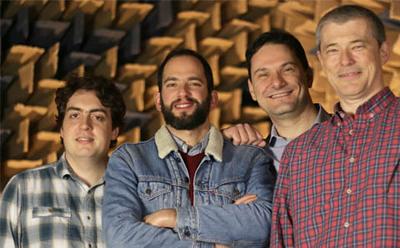Acoustic engineers secure investment in 3D audio technology

Researchers from the University of Southampton have raised £500,000 to deliver an immersive 3D audio technology which aims to become the ‘gold standard’ for future sound systems.
The AudioScenic spinout, which combines academic expertise with commercial leadership, will use the investment from the IP Group to bring the innovation to market with support from the University’s on-campus Future Worlds accelerator.
AudioScenic’s technology uses destructive and constructive sound cancellation techniques to produce realistic 3D audio from a single, compact soundbar. The system uses complex image processing from an integrated camera to track the listener’s head as it moves and project an updated sound field in real time.
Prototypes for laptops, gaming soundbars and home cinema systems have been demonstrated on the Future Worlds stand at the recent Consumer Electronics Show in Las Vegas and will now be progressed with commercial partners.
Co-founder Dr Marcos Simón, a Research Fellow within the Institute for Sound and Vibration Research, said: “Our technology can perfectly reproduce 3D audio, offering listeners a personalised experience akin to someone whispering in your ear. Similar techniques have been very cumbersome in the past, requiring a complex setup or bulky headphones, and have now been achieved in a simple and elegant manner.
“We have demonstrated the power of this technology in an academic setting and are now aiming to become a world leader in listener-adaptive audio reproduction, with these novel methods becoming the gold standard for consumer audio devices of the near future.”
AudioScenic taps into binaural methods of recording which capture audio from two microphones to create a 3D stereo sound sensation for the listener of being in the place where the recording was made. Binaural audio can also be generated by synthesizing mono signals through transfer functions, such as combining the eight channels of a 7.1 surround audio system.
The spinout draws upon advances from the S3A spatial audio programme, a five-year research collaboration funded by the Engineering and Physical Sciences Research Council for audio experts at the universities of Southampton, Surrey and Salford and BBC R&D, and has benefitted from support from the University’s Research and Innovation Services, the SETsquared partnership and the Catalyst Centre.
AudioScenic is led by audio industry veteran David Monteith as CEO and includes co-founders Marcos and Dr Filippo Fazi along with senior engineer Dr Tyler Ward. The business will continue its journey with leading intellectual property commercialisation company IP Group as the latest addition to its long-term partnership model.